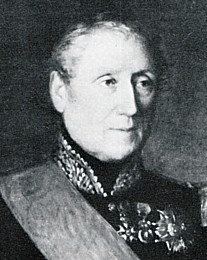Philippe-Antoine d'Ornano
Philippe-Antoine Auguste d'Ornano, Comte de l'Empire , actually Filippo Antonio Ornano (born January 17, 1784 in Ajaccio , † October 13, 1863 in Vincennes ), was a French general, peer , marshal of France and governor des Invalides .
Life
Ornano was the son of Lodovico Antonio Ornano (1744–1816) and Isabella Maria Buonaparte (1749–1816) and thus a second cousin of Napoleon I.
He served in Italy in 1799 and 1800 and then took part in the expedition to Santo Domingo . From 1805 to 1808 he served in the Grande Armée and was then commanded to Spain with the 5 e régiment de dragons . On November 22, 1808, Napoleon awarded him the newly created nobility title of Comte de l'Empire (roughly: Count of the Empire ). On May 5, 1811, he was promoted to Général de brigade on the battlefield of Fuentes de Oñoro . In 1812 he returned to the Grande Armée and took part in the Russian campaign, where he distinguished himself in the Battle of Borodino (September 7, 1812) and was promoted to Général de division . In the Battle of Krasnoye (November 18, 1812) he was wounded and left for dead on the battlefield. He owed his "resurrection" to his adjutant Delaberge, who refused to bury him on the spot.
In the campaign of 1813 he took part as commander of the regiment of the Dragons de la Garde impériale , which was set up in 1806 and, after Bessières' death, temporarily also commanded the Cavalerie de la Garde impériale . In the Battle of Waterloo he was assigned to command the Dragons de la Garde impériale, but was not present and had to be replaced by the Général de brigade Louis-Michel Letort de Lorville .
In 1816 Count d'Ornano married the widowed Polish Countess Maria Walewska , the former lover of his cousin, who died in childbirth the following year .
Ornano returned to active service in 1829. He was appointed Inspector General of the Second and Third Military Divisions. In 1829 he was chairman of the admissions committee of the Saint-Cyr military school , and in 1830 he took command of the fourth military division in Tours . In 1832 he took part in the suppression of the uprising in the Vendée and was appointed peer of France . Appointed commander of the 14th Military Division in 1848, he did not take up this post for health reasons, was first put up for disposition and then retired.
Since 1849 MP for the Indre-et-Loire department , he supported the coup d'état of Napoléon III and was honored several times for it: he was awarded the Grand Cross of the Legion of Honor and appointed Senator. After Exelmans' death he succeeded him as Grand Chancellor of the Legion of Honor, and on May 24, 1853 he was appointed Governor de l'Hôtel des Invalides . On April 2, 1861, the day the remains of Napoleon were transferred from the Chapelle Saint-Jérôme under the dome of the Invalides , he was appointed Marshal of France. Eighteen months later he died in Paris.
See also: Sampiero Corso
progeny
From the marriage with Maria Walewska a son emerged:
He continued the count's line of the family, the last prominent representative of which was Michel d'Ornano († 1991), two-time Minister of Culture of the Fifth French Republic .
Awards
- 1850: Grand Cross of the Legion of Honor (August 11, 1850), Grand Chancellor (August 13, 1852 to March 24, 1853)
- His name is entered on the triumphal arch in Paris in the 12th column (ORNANO (D ')).
| personal data | |
|---|---|
| SURNAME | Ornano, Philippe-Antoine d ' |
| ALTERNATIVE NAMES | Ornano, Filippo Antonio |
| BRIEF DESCRIPTION | French general, peer and marshal of France |
| DATE OF BIRTH | January 17, 1784 |
| PLACE OF BIRTH | Ajaccio |
| DATE OF DEATH | October 13, 1863 |
| Place of death | Vincennes |
